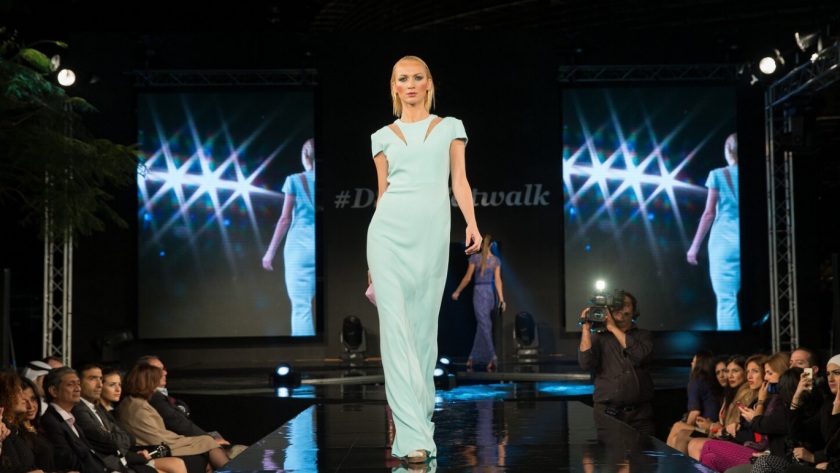During the coronavirus pandemic, the fashion industry and runway shows get a high-tech update
When you think of fashion week, rapid camera flashes, celebrity appearances, and exclusive shows come to mind. This year, the COVID-19 pandemic is forcing fashion weeks all around the world to rethink their formatting and create a new digital experience.
While some fashion weeks chose to postpone or cancel their showsー Men’s fashion week in Milan and Parisー many are going fully virtual for the first time in history. As runway shows are forced to adapt, how else will technology continue to change the fashion industry?

THE VIRTUAL SHOPPING EXPERIENCE
The way we shop has dramatically been altered in the past few decades. Rather than visit a store to buy a product, consumers can purchase it online with just a few clicks, accessing a vast global market. Due to the rise of e-commerce, more and more buyers are also turning to the internet for their fashion needs. According to Statista, approximately 2.14 billion people will be buying goods and services online by 2021. The fashion industry has already started adapting by shifting towards digital advertising over print. In 2016, the global luxury market spent over $1 billion on online ads, utilizing social media and online video channels.
Utilizing technology to advertise and sell can take a lot of time and money that not all brands have. Digitizing the fashion experience can be really beneficial to emerging talent. Small brands that averaged a few hundred views were able to reach a global audience of 20,000 to 40,000 people with Shanghai Fashion Week. Thanks to their “See Now, Buy Now” format, this event generated more than RMB20 million in gross merchandise volume. Building a strong online presence will only become more important as we enter an increasingly tech-dominated world.
CONNECTING TO A BIGGER, GLOBAL AUDIENCE
Especially true of the “Big Four” fashion weeks, these events are often seen as exclusive; invites can cost thousands of dollars and attendees include celebrities, socialites, and industry insiders. However, with COVID-19 forcing the industry to adapt, the shows are more accessible. Even without media experience, connections, or celebrity status, consumers can partake in the event from the comfort of their own home. In June, London Fashion Week will relaunch as a digital-only platform with multimedia content. Consumers from all around the world can look forward to viewing the collections, exploring podcasts, and reading exclusive interviews.
This is a similar model that Shanghai Fashion Week introduced in April. They encouraged designers to use the internet to market themselves. Streetwear brand Babyghost showed its collection with commentary from an Elle Magazine editor. Labelhood, a Shanghai-based fashion incubator, regularly featured emerging designers in their livestreams.
During the actual show, over 150 designers and brands showcased their collections, reaching 11 million views. Not confined to a set venue and particular messaging, designers were given an hour to spend as they pleased. Some designers, like Shuting Qiu, spent it discussing her inspiration and brand values. Others shared pre-recorded runway footage, like Angel Chen. By utilizing technology, fashion week becomes a more inclusive and immersive experience.
WHAT WILL COME NEXT?
Besides enhancing the fashion experience, technology also has the potential to completely change the industry. In 2011, Burberry promoted the opening of its new flagship store in Beijing with a runway show featuring holographic models. The brand collaborated with Musion Eyeliner to create a new virtual experience. While the holograms walked the runway, real-time video and computer graphics altered the model and its clothes.
In 2015, Cartier employed hologram technology to project their watches for store windows for their marketing campaign. Ralph Lauren did the same at its Fifth Avenue flagship in 2017, and for the 50th anniversary of the brand, collaborated with Cinimod Holograms to create a hologram of its founder. Lauren used this hologram to virtually accept his GQ Design Legend of the Year award in 2018.
Founded by Kostas Koukoravas, Intelistyle creates a custom consumer experience by offering styling tips from their AI stylist. It examines thousands of outfits put together by human stylists, influencers, designers and retailers and keeps itself up to date on global and location-specific trends. At London Fashion Week in 2019, Intelistyle generated 10 sets of outfits; each set contained an outfit styled by AI and one styled by a fashion influencer. Out of their participants, 70% of them prefered the outfits created by Intelistyle. They now work with luxury brands like MaxMara and Lane Crawford. As brands continue to explore new digital possibilities, the future of fashion looks more tech-savvy than ever.
Writer’s bio
Haley Sengsavanh is a freelance writer and student journalist based in Vancouver, BC. From fashion and lifestyle to politics and community, she enjoys covering a wide range of topics. Sengsavanh has been featured in Changing Womxn Collective, Micro Macro Magazine, published with the Vancouver School Board, and more! She is excited to begin studying journalism at the University of British Columbia this Fall.
Web https://haleysengsavanh.wixsite.com/journalism
Instagram @haleysengsavanh

